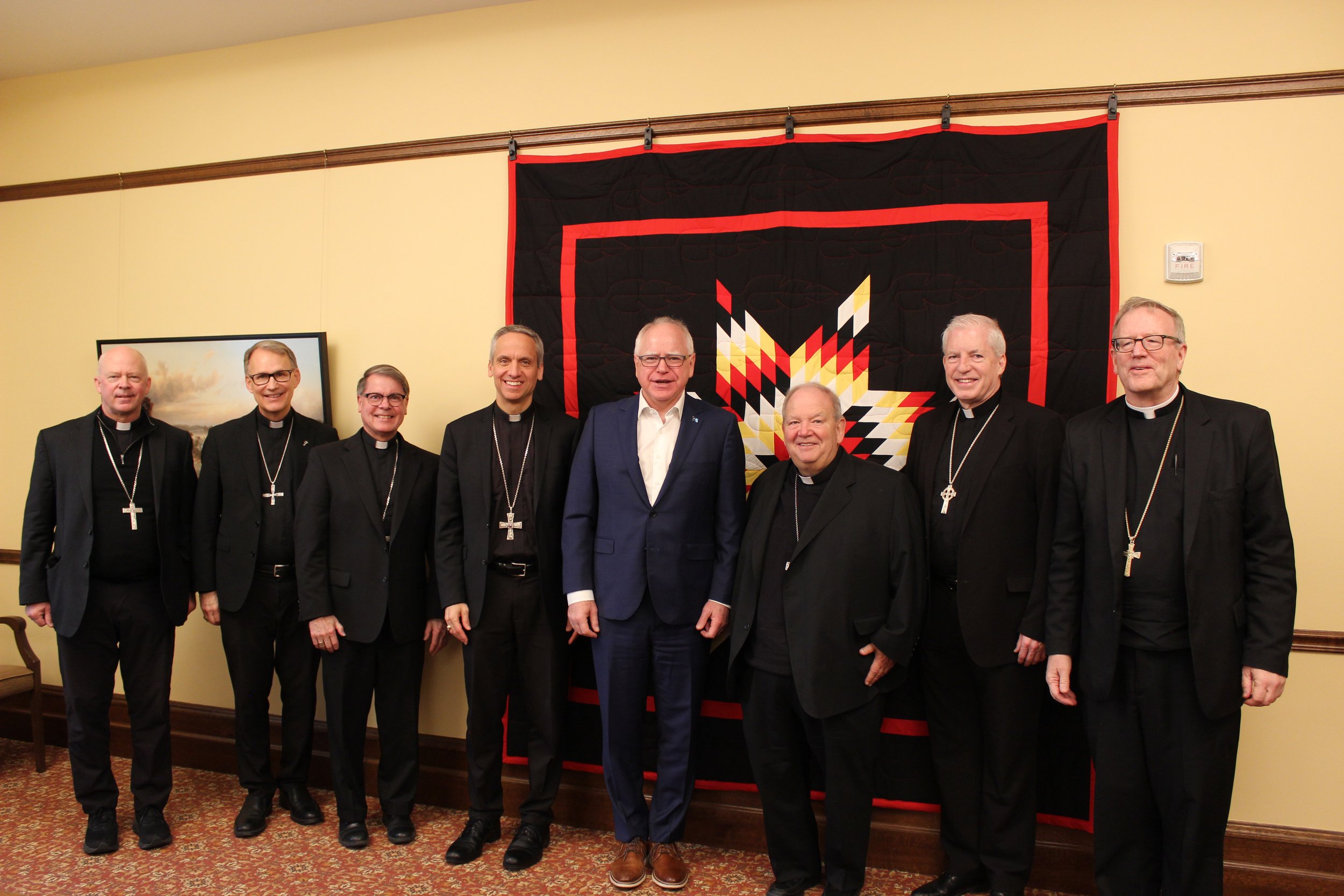Bishop Chad Zielinski of New Ulm (far left) along with bishops from across Minnesota met with Gov. Walz and legislators March 27 at the Minnesota State Capitol building to discuss pertinent topics such as the Minnesota Child Tax Credit, online sports gambling, protecting nonpublic pupil aid and MinnesotaCare for undocumented immigrants.
by Minnesota Catholic Conference
ST. PAUL, MINN. - On Thursday, March 27, the bishops of the Minnesota Catholic Conference (MCC) gathered at the State Capitol for their annual advocacy day. While MCC staff represent the bishops' voices year-round, this annual visit allows the bishops to engage with lawmakers directly, advocate for key issues, and foster personal relationships with elected officials.
Throughout the day, the bishops engaged in principled, nonpartisan advocacy, discussing a range of legislative issues. Even in areas of disagreement, they upheld the Church’s moral teachings while fostering constructive dialogue and collaboration across political lines. Below, we highlight a few of those issues discussed.
Engaging Legislative Leadership
During their visit, the bishops met with Governor Tim Walz and key legislative leaders, including Senate Majority Leader Erin Murphy, Senate Minority Leader Mark Johnson, House Speaker Lisa Demuth, House Majority Leader Harry Niska, and House DFL Leader Melissa Hortman. They also met with Commissioner of Revenue Paul Marquart.
Beyond these high-level meetings, the bishops made it a priority to connect with lawmakers from their individual dioceses during a morning reception. These conversations reinforced the importance of faithful citizenship and strengthened the relationships between Church leaders and elected officials. Throughout the day, the bishops met with more than 25 legislators and engaged in numerous discussions with staff, lobbyists, and visitors in the Capitol hallways.
Protecting Nonpublic Pupil Aid
One of the bishops’ primary concerns was Governor Walz’s proposal to eliminate nonpublic pupil aid from the state budget—a move that would strip $50 million in funding for essential services such as transportation, nursing, and standardized testing for nonpublic school students. If enacted, this cut would increase costs for families by over $1,000 per student annually. The bishops emphasized that this funding represents just less than one half of one percent of total state government education spending, yet its removal would have a disproportionate impact on thousands of Minnesota families. Lawmakers have already received thousands of emails, calls, and meeting requests from constituents urging them to protect this vital funding.
Expanding the Child Tax Credit
The bishops also advocated for expanding Minnesota’s Child Tax Credit by 20%, enabling more middle-class families to benefit. As of February 2025, the program has positively impacted 566,000 children, and an expansion could reach an additional 200,000. During their discussion with Commissioner Marquart, the bishops emphasized that strengthening the Child Tax Credit aligns with the state’s commitment to supporting families and alleviating childhood poverty. There is broad bipartisan support for expanding the credit.
Opposing Online Sports Gambling Expansion
The bishops voiced concerns about proposals to legalize online sports gambling, warning that placing a virtual casino in every pocket via smartphones could have devastating consequences—especially for individuals susceptible to addiction. They urged legislators to consider the long-term social costs before expanding access to gambling.
A Model of Faithful Citizenship
As the Minnesota Legislature reaches the midpoint of the 2025 session, lawmakers are making critical decisions about which bills will advance and ultimately become law. In this pivotal moment, the bishops of Minnesota are calling on legislators to support policies that serve the common good, strengthen families, and protect the most vulnerable.
Visit www.MNCatholic.org/actionalerts to contact your legislators via email, phone, or video message. Together, we can advocate for policies that prioritize the dignity and well-being of all Minnesotans.

